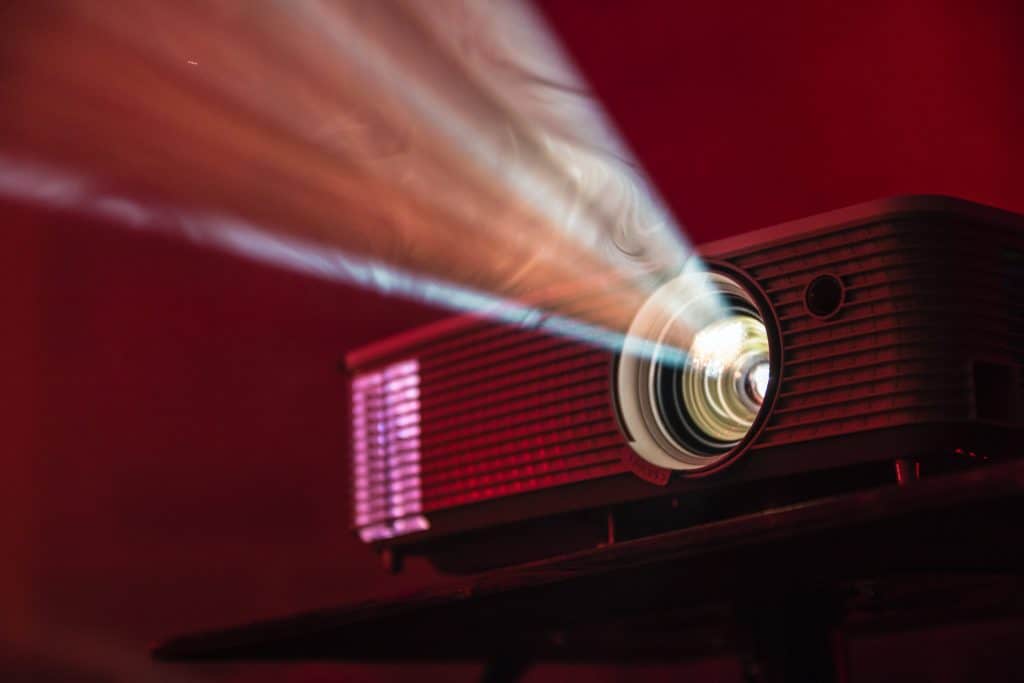If you are looking for a quick guide on how to choose a home theater projector then look no further because you just found it.
Admit it, you’ve probably already thought about buying a movie projector for your home but never really acted on it because let us be honest here, it’s not exactly a cheap investment.
If you think about it, home theater projectors can’t compete with the cinema viewing experience just for the sheer size of the screen alone.
Or can it?

Home theater projectors have come a long way, thanks to consistent advancements in projector technology. The days of the blurry school projectors are long gone. Most projectors today can easily emulate the cinema experience with very little effort.
And with online streaming quickly becoming the medium of choice for many, it seems the perfect time to buy a home projector.
But how does one go buying a home theater projector anyway?
This is where this guide comes in. We are going to help you in how to choose a home theater projector based on your needs, budget, and requirements.
You don’t always need the best nor the most expensive projectors available.
In this guide, we are going to show you can do a lot more with a lot less by just following these simple guidelines.
Table of Contents
How To Choose A Home Theater Projector – What You Need To Know
The first thing to know about projectors is there are several types of projectors to choose from.
I won’t dive much into the finer details of these projectors because if I do, it would take more than half of this article – but I will cover all the key areas.
Projector types
There are three major types of video projectors available:
DLP (Digital Light Processing)
DLP Projectors use chips made of microscopic mirrors and a spinning color wheel to create an image. DLP projectors are known for their sharper image since the light comes from just one source.
One caveat is the effective lamp life of a DLP projector is only 2000-5000 hours. That’s around 2000 movies, in case you’re wondering. That’s still plenty but it is no match for the next two types of projectors on this list.
LCD (Liquid Crystal Display)
LCD projectors, as the name suggests, use LCD. Unlike DLP projectors, they do not have any moving parts which mean that they are generally cheaper than other types of projectors.
The downside of this tech is it will require constant filter maintenance and generally have a lower contrast ratio (which we will discuss in the section down below).
LED
LED projectors are generally the same as other projectors in terms of tech. The only difference is the light technology used to produce the image. These projectors use a combination of red, green, and blue LEDs.
LED projectors are known to have an extremely long lifespan, up to 10x longer than LCD projectors.
Light output and brightness
This is one of the first qualities you need to check when buying a home theater projector.
I won’t go into the nitty-gritty details of why this is important. Let’s just say that a brighter projector is best suited for rooms with ambient light. Of course, you don’t always need the brightest projectors out there.
You can get away with using a moderately bright projector if your home theater is dark enough. But that also depends on the size of your room and the distance from the wall.
**Pro tip: Instead of spending extra on brighter projectors, just invest in some blackout curtains instead. A darker room would be more impact on your viewing experience than a brighter image.
Contrast Ratio
Brightness and contrast ratio are the most complementary specs of your projector.
A high contrast ratio projector will produce sharper images. The contrast ratio is the difference between the whitest whites and the blackest blacks. The higher the contrast ratio, the better the image pops.
1,500:1 contrast ratio is good. But you can never go wrong with something higher.
Color reproduction
This quality seems to be more subjective compared to the others in this list.
You can also tweak the settings on your projector to make it match your color watching profile.
Compatibility
Of course, you want to ensure that the projector you just bought can plug right into your home theater system.
You most like won’t have a problem with it since most modern projectors have all the inputs that you need like HDMI, VGA, or even DVI for your computer.
If for some reason, you decided to buy an old model projector, you may need to buy some additional adapters to get it to connect to newer home theater systems.
Display Resolution
The higher the display resolution, the better the image.
But this also means another thing – the higher the price tag.
The best way to determine what screen resolution will work better is to check the actual video resolutions of the contents you are consuming. If most of your video consumptions are still in 1080p, there’s very little need to jump to 4K, but that still depends on the viewing distance.
If you want to project into a much bigger area, then 4K may be your best bet.
Does Your Room Size And Placement Location Matter?
The short answer is YES.
Probably an even more important metric is the distance to the screen of the projector. For small to medium houses, the distance of the projector from the screen is typically between 1.5-2.5 meters. This is what you call the ‘throw distance.’
Bigger rooms may need a projector that has a throw distance of 3 meters or higher.
If for some reason you decided to move the projector farther than its recommended throw distance, the produced image will not be as sharp as compared to when it is inside the throw distance recommendation.
That is why it is important to understand the potential placement location of your projector. If you have a big room, get a long throw projector. For smaller rooms, short-throw projectors would work best.
Now, if you want to be precise with it, you can always visit projector central to check your projector model. You can adjust several metrics in there to get the most accurate representation of your viewing dimensions.
Other Factors To Consider When Buying a Projector?
Apart from the budgetary concerns, which most of us buyers would have, there are other seemingly overlooked factors when buying a home theater projector.
One example is ambient lighting. As I’ve said before, the brightness of your projector shouldn’t be that much of a concern if you’ve managed to make your theater room as dark as cinemas.
Now, if you want to set up your home theater in your living room where ambient lighting is practically a mainstay, then go for a higher lumen rating. Just make sure that you are looking at the right unit. The unit of choice when it comes to projector brightness is ANSI Lumens.
For most households, 2600- 3500 lumens is perfect. You can still have a clear image even in daylight. However, if you want to truly mimic the cinema experience, 1600 lumens is the way to go, but the room must be super dark for it to work properly.
The Best Advice For Choosing a Home Theater Projector In 2025
Choosing a home theater projector in 2025 shouldn’t be that difficult anymore considering the number of available projectors in the market today. You can always go with the best-sellers on Amazon or go for something extra and buy the best (and probably the most expensive) one available.
Whatever the case may be, choosing a home theater projector should be tailored to your preference and yours alone. Do not give in to buying whatever is promoted or on sale. Buy around your actual need – this is important!
If you have a smaller theater room, then consider that into your purchase and buy a smaller projector. Bigger theater room? Go with a big projector. So on and so forth.
Your home theater viewing should be a great experience for you and your family. Choosing the right home theater projector is the best way to ensure that this happens.
More information on home theaters
- Do I Need a Projector Screen? We Find Out!
- How To Connect A Mini Projector To A Phone
- Find our list of the Best projectors under £200
- How Do Home Theater Projectors Work: A Guide To The Perfect Home Theater
We will be doing a series of articles like these that focus on home theater projectors. If you want to keep up-to-date with our content, always check our home page for new articles.

